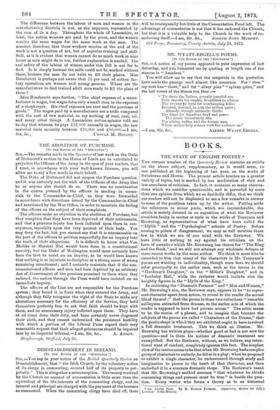THE ABOLITION OF PURCHASE.
[TO TIM EDITOR OF TER " SPECTATOR:]
Sin,—The remarks made in the Spectator of last week on the Duke of Richmond's motion in the House of Lords are so calculated to prejudice the Officers of the Army in the eyes of your readers, that I trust, in accordance with your well-known fairness, you will allow me to say a few words in their behalf.
The Duke of Richmond did not reopen the Purchase question, and it was certainly not the wish of the Officers of the Army that he or anyone else should do so. There was no combination in the course pursued by the officers in sending in memo- rials to the Commander-in-Chief, as they were forwarded in accordance with directions issued by the Commander-in-Chief and sanctioned by the War Office, in order to ascertain the feeling of the officers on the subject of their complaints.
The officers make no objection to the abolition of Purchase, but they complain that they have been deprived of their retirements, and that a grievous injury has been inflicted upon them in con- sequence, especially upon the very poorest of their body. You may deny the fact, but you cannot say that it is unreasonable on the part of the officers to petition respectfully for an inquiry into the truth of their allegations. It is difficult to know what Von Moltke or Marshal Niel would have done in a constitutional country, but the Duke of Wellington would most certainly have been the first to insist on an inquiry, as he would have known that nothing is so injurious to discipline as a strong sense of wrong remaining unredressed ; and I certainly maintain that if the non- commissioned officers and men had been deprived by an arbitrary Act of Government of the pensions promised to them when they enlisted, the nation through the Press would have insisted on an immediate inquiry.
The officers of the Line are not responsible for the Purchase system ; they found it in force when they entered the Army, and although they fully recognise the right of the State to make any alterations necessary for the efficiency of the Service, they hold themselves perfectly free to ask that faith should be kept with them, and no unnecessary injury inflicted upon them. They have at all times done their duty, and have certainly never disgraced their cloth, and they cannot understand the persistent hostility with which a portion of the Liberal Press regard their very reasonable request that their alleged grievances should be inquired into by an impartial tribunal.—I am, Sir, &c., A. ANSON. S'hugborough, Stafford, July 31.






























 Previous page
Previous page